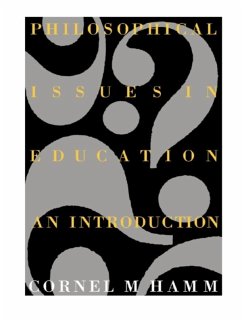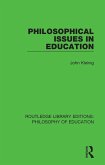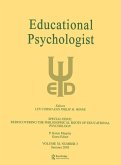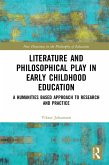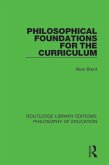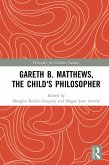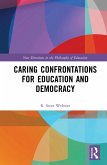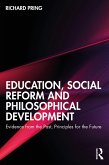31,95 €
31,95 €
inkl. MwSt.
Sofort per Download lieferbar

16 °P sammeln
31,95 €
Als Download kaufen

31,95 €
inkl. MwSt.
Sofort per Download lieferbar

16 °P sammeln
Jetzt verschenken
Alle Infos zum eBook verschenken
31,95 €
inkl. MwSt.
Sofort per Download lieferbar
Alle Infos zum eBook verschenken

16 °P sammeln
- Format: ePub
- Merkliste
- Auf die Merkliste
- Bewerten Bewerten
- Teilen
- Produkt teilen
- Produkterinnerung
- Produkterinnerung

Bitte loggen Sie sich zunächst in Ihr Kundenkonto ein oder registrieren Sie sich bei
bücher.de, um das eBook-Abo tolino select nutzen zu können.
Hier können Sie sich einloggen
Hier können Sie sich einloggen
Sie sind bereits eingeloggt. Klicken Sie auf 2. tolino select Abo, um fortzufahren.

Bitte loggen Sie sich zunächst in Ihr Kundenkonto ein oder registrieren Sie sich bei bücher.de, um das eBook-Abo tolino select nutzen zu können.
First published in 1989. Routledge is an imprint of Taylor & Francis, an informa company.
- Geräte: eReader
- mit Kopierschutz
- eBook Hilfe
- Größe: 0.3MB
Andere Kunden interessierten sich auch für
![Philosophical Issues in Education (eBook, ePUB) Philosophical Issues in Education (eBook, ePUB)]() John KleinigPhilosophical Issues in Education (eBook, ePUB)26,95 €
John KleinigPhilosophical Issues in Education (eBook, ePUB)26,95 €![Rediscovering the Philosophical Roots of Educational Psychology (eBook, ePUB) Rediscovering the Philosophical Roots of Educational Psychology (eBook, ePUB)]() Rediscovering the Philosophical Roots of Educational Psychology (eBook, ePUB)19,95 €
Rediscovering the Philosophical Roots of Educational Psychology (eBook, ePUB)19,95 €![Literature and Philosophical Play in Early Childhood Education (eBook, ePUB) Literature and Philosophical Play in Early Childhood Education (eBook, ePUB)]() Viktor JohanssonLiterature and Philosophical Play in Early Childhood Education (eBook, ePUB)41,95 €
Viktor JohanssonLiterature and Philosophical Play in Early Childhood Education (eBook, ePUB)41,95 €![Philosophical Foundations for the Curriculum (eBook, ePUB) Philosophical Foundations for the Curriculum (eBook, ePUB)]() Allen BrentPhilosophical Foundations for the Curriculum (eBook, ePUB)39,95 €
Allen BrentPhilosophical Foundations for the Curriculum (eBook, ePUB)39,95 €![Gareth B. Matthews, The Child's Philosopher (eBook, ePUB) Gareth B. Matthews, The Child's Philosopher (eBook, ePUB)]() Gareth B. Matthews, The Child's Philosopher (eBook, ePUB)41,95 €
Gareth B. Matthews, The Child's Philosopher (eBook, ePUB)41,95 €![Caring Confrontations for Education and Democracy (eBook, ePUB) Caring Confrontations for Education and Democracy (eBook, ePUB)]() R. Scott WebsterCaring Confrontations for Education and Democracy (eBook, ePUB)41,95 €
R. Scott WebsterCaring Confrontations for Education and Democracy (eBook, ePUB)41,95 €![Education, Social Reform and Philosophical Development (eBook, ePUB) Education, Social Reform and Philosophical Development (eBook, ePUB)]() Richard PringEducation, Social Reform and Philosophical Development (eBook, ePUB)38,95 €
Richard PringEducation, Social Reform and Philosophical Development (eBook, ePUB)38,95 €-
-
-
First published in 1989. Routledge is an imprint of Taylor & Francis, an informa company.
Dieser Download kann aus rechtlichen Gründen nur mit Rechnungsadresse in A, B, BG, CY, CZ, D, DK, EW, E, FIN, F, GR, HR, H, IRL, I, LT, L, LR, M, NL, PL, P, R, S, SLO, SK ausgeliefert werden.
Produktdetails
- Produktdetails
- Verlag: Taylor & Francis eBooks
- Seitenzahl: 200
- Erscheinungstermin: 2. September 2003
- Englisch
- ISBN-13: 9781135388164
- Artikelnr.: 47890919
- Verlag: Taylor & Francis eBooks
- Seitenzahl: 200
- Erscheinungstermin: 2. September 2003
- Englisch
- ISBN-13: 9781135388164
- Artikelnr.: 47890919
- Herstellerkennzeichnung Die Herstellerinformationen sind derzeit nicht verfügbar.
Cornel M Hamm
Part 1 The nature of philosophical inquiry into educational discourse: definitions and the problem of meaning. Part 2 Metaphors in educational Discourse: Pitfalls Of Language-Vagueness, Ambiguity, Emotive Uses
metaphorical language
analyzing educational metaphors. Part 3 An analysis of the concept of education: several uses of the term education
R.S.Peters' analysis of education
critical remarks on Peters' Criteria. Part 4 Aims in education: the logic of aim
development of persons as the aim of education
interpreting aims of education
the role of the school in society. Part 5 Educational curricula and the nature of knowledge: the concept of curriculum
elements of curriculum
the nature of knowledge
the differentiation of knowledge
criticism of Hirst's forms of knowledge. Part 6 Child- centred curricula: contrasting approaches to curriculum
the needs curriculum
human nature considerations
priciples for selecting curriculum content. Part 7 Teaching and learning in education: the concept learning
the concept teaching
relationships between education, teaching and learning
indoctrination and other forms of Mis- Education. Part 8 Inter-personal and social issues in education: discipline
punishment
freedom and authority
the student-teacher relationship. Part 9 Moral education: introduction - why moral education? moral education and values education
moral development as the achievement of virtue
the paradox of moral education. Part 10 The justification of education: the nature of the justification
kinds of justification
a moral argument
instrumental justification
the pleasure principle as justification
non-instrumental instrinsic justification.
metaphorical language
analyzing educational metaphors. Part 3 An analysis of the concept of education: several uses of the term education
R.S.Peters' analysis of education
critical remarks on Peters' Criteria. Part 4 Aims in education: the logic of aim
development of persons as the aim of education
interpreting aims of education
the role of the school in society. Part 5 Educational curricula and the nature of knowledge: the concept of curriculum
elements of curriculum
the nature of knowledge
the differentiation of knowledge
criticism of Hirst's forms of knowledge. Part 6 Child- centred curricula: contrasting approaches to curriculum
the needs curriculum
human nature considerations
priciples for selecting curriculum content. Part 7 Teaching and learning in education: the concept learning
the concept teaching
relationships between education, teaching and learning
indoctrination and other forms of Mis- Education. Part 8 Inter-personal and social issues in education: discipline
punishment
freedom and authority
the student-teacher relationship. Part 9 Moral education: introduction - why moral education? moral education and values education
moral development as the achievement of virtue
the paradox of moral education. Part 10 The justification of education: the nature of the justification
kinds of justification
a moral argument
instrumental justification
the pleasure principle as justification
non-instrumental instrinsic justification.
Part 1 The nature of philosophical inquiry into educational discourse: definitions and the problem of meaning. Part 2 Metaphors in educational Discourse: Pitfalls Of Language-Vagueness, Ambiguity, Emotive Uses
metaphorical language
analyzing educational metaphors. Part 3 An analysis of the concept of education: several uses of the term education
R.S.Peters' analysis of education
critical remarks on Peters' Criteria. Part 4 Aims in education: the logic of aim
development of persons as the aim of education
interpreting aims of education
the role of the school in society. Part 5 Educational curricula and the nature of knowledge: the concept of curriculum
elements of curriculum
the nature of knowledge
the differentiation of knowledge
criticism of Hirst's forms of knowledge. Part 6 Child- centred curricula: contrasting approaches to curriculum
the needs curriculum
human nature considerations
priciples for selecting curriculum content. Part 7 Teaching and learning in education: the concept learning
the concept teaching
relationships between education, teaching and learning
indoctrination and other forms of Mis- Education. Part 8 Inter-personal and social issues in education: discipline
punishment
freedom and authority
the student-teacher relationship. Part 9 Moral education: introduction - why moral education? moral education and values education
moral development as the achievement of virtue
the paradox of moral education. Part 10 The justification of education: the nature of the justification
kinds of justification
a moral argument
instrumental justification
the pleasure principle as justification
non-instrumental instrinsic justification.
metaphorical language
analyzing educational metaphors. Part 3 An analysis of the concept of education: several uses of the term education
R.S.Peters' analysis of education
critical remarks on Peters' Criteria. Part 4 Aims in education: the logic of aim
development of persons as the aim of education
interpreting aims of education
the role of the school in society. Part 5 Educational curricula and the nature of knowledge: the concept of curriculum
elements of curriculum
the nature of knowledge
the differentiation of knowledge
criticism of Hirst's forms of knowledge. Part 6 Child- centred curricula: contrasting approaches to curriculum
the needs curriculum
human nature considerations
priciples for selecting curriculum content. Part 7 Teaching and learning in education: the concept learning
the concept teaching
relationships between education, teaching and learning
indoctrination and other forms of Mis- Education. Part 8 Inter-personal and social issues in education: discipline
punishment
freedom and authority
the student-teacher relationship. Part 9 Moral education: introduction - why moral education? moral education and values education
moral development as the achievement of virtue
the paradox of moral education. Part 10 The justification of education: the nature of the justification
kinds of justification
a moral argument
instrumental justification
the pleasure principle as justification
non-instrumental instrinsic justification.
